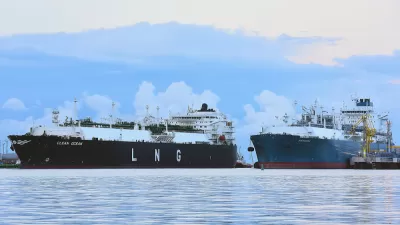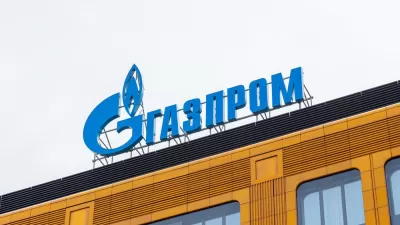After a second day of talks in Brussels, ambassadors to the European Union agreed to ban coal imports from Russia as evidence of widescale atrocities committed by Russian troops in Ukraine surfaced after their withdrawal from the outskirts of Kyiv.

"It took two days of protracted talks in Brussels for the European Union to approve a fifth round of sanctions against Russia that included its first ban on a Russian energy source, coal," wrote Matina Stevis-Gridneff, Michael Levenson and Steven Erlanger for The New York Times on April 7. "But the measures were softened by several caveats, highlighting Europe’s diminishing appetite to absorb further economic fallout from the war."
"The ban would be phased in over four months, instead of three as originally proposed, according to E.U. diplomats. Germany had been pushing for a longer transition period to wind down existing contracts, even though Russian coal is easier to replace with purchases from other suppliers, compared with oil and gas."
"Imports from Russia accounted for 47 percent of coal coming into the European Union in 2019, according to the European Union’s statistics office, Eurostat, making the country the most important supplier of the fuel," reported Berlin-based Melissa Eddy for the Times on April 6. "That amounts to four billion euros [$4.34 billion] worth of coal annually, Ursula von der Leyen, the European Commission president, said."
"Each member state has different energy needs, and among those most dependent on Russian energy overall is Germany, the bloc’s largest economy. Roughly half of all coal that Germany imports comes from Russia, last year totaling €2.2 billion [$2.39 billion], according to government figures. Most is used to generate electricity and power Germany’s steel industry."
Oil and gas imports continue
"Ukrainian officials had urged Western nations to go further and completely cut off purchases of Russian oil and gas, contending that existing sanctions would not cripple Russia’s economy quickly or severely enough to affect President Vladimir V. Putin’s campaign to subjugate Ukraine by force," added Stevis-Gridneff, Levenson and Erlanger.
"As long as the West continues buying Russian gas and oil, it is supporting Ukraine with one hand while supporting the Russian war machine with the other hand," Ukraine’s foreign minister, Dmytro Kuleba, said Thursday at NATO headquarters in Brussels, where he urged members of the alliance to accelerate promised help to Ukraine’s outgunned military.
"Europe’s current energy policy isn’t sustainable," opined Bloomberg Opinion columnist Javier Blas on April 5. "It’s hypocritical, and leaves the region at the mercy of Moscow. The alternative isn’t pretty, but Europe needs to prepare for it."
Lithuania
Only one European country has chosen to stop importing Russian natural gas, according to the PBS NewsHour's foreign affairs and defense correspondent, Nick Schifrin. Foreign Minister Gabrielius Landsbergis of Lithuania explained how the need for energy security led the Baltic state to free itself from Russian gas in a NewsHour segment on April 7.
"We made the first steps actually in 2008. Back then, we were paying the highest price in Europe for the gas imports. We were dependent on one gas pipeline from Russia, which was constantly under repair due to, well, what we considered political reasons. So we started building a floating LNG terminal, which was finished in 2014.
And we were able to procure our gas from anywhere."
U.N. action
Also on Thursday, the United Nations General Assembly voted to suspend Russia from the U.N. Human Rights Council after atrocities surfaced in the towns and cities that Russian troops occupied outside of the capital, Kyiv when their forces retreated.
"Russia’s suspension is the first time one of the five permanent members of the U.N. Security Council has lost its membership rights in any United Nations organization, rights groups said," reported the Times on April 7.
Hat tip to Carole Landry who included the new EU energy ban in her Russia-Ukraine War Briefing on April 6.
FULL STORY: West Moves to Curb Russian Coal and Trade Over Ukraine War

Maui's Vacation Rental Debate Turns Ugly
Verbal attacks, misinformation campaigns and fistfights plague a high-stakes debate to convert thousands of vacation rentals into long-term housing.

Planetizen Federal Action Tracker
A weekly monitor of how Trump’s orders and actions are impacting planners and planning in America.

San Francisco Suspends Traffic Calming Amidst Record Deaths
Citing “a challenging fiscal landscape,” the city will cease the program on the heels of 42 traffic deaths, including 24 pedestrians.

Half of Post-Fire Altadena Home Sales Were to Corporations
Large investors are quietly buying up dozens of properties in Altadena, California, where a devastating wildfire destroyed more than 6,000 homes in January.

Opinion: What San Francisco’s Proposed ‘Family Zoning’ Could Really Mean
Mayor Lurie is using ‘family zoning’ to encourage denser development and upzoning — but could the concept actually foster community and more human-scale public spaces?

Jacksonville Launches First Autonomous Transit Shuttle in US
A fleet of 14 fully autonomous vehicles will serve a 3.5-mile downtown Jacksonville route with 12 stops.
Urban Design for Planners 1: Software Tools
This six-course series explores essential urban design concepts using open source software and equips planners with the tools they need to participate fully in the urban design process.
Planning for Universal Design
Learn the tools for implementing Universal Design in planning regulations.
Gallatin County Department of Planning & Community Development
Heyer Gruel & Associates PA
JM Goldson LLC
City of Camden Redevelopment Agency
City of Astoria
Transportation Research & Education Center (TREC) at Portland State University
Jefferson Parish Government
Camden Redevelopment Agency
City of Claremont





























